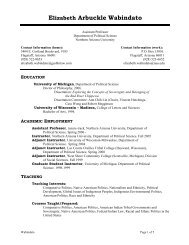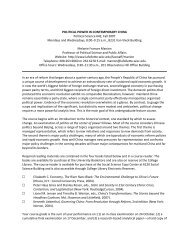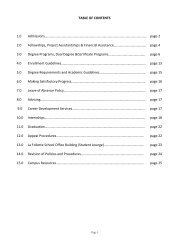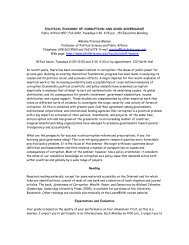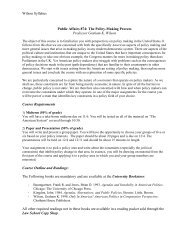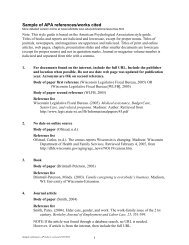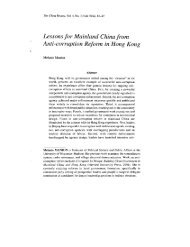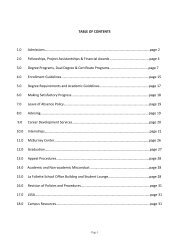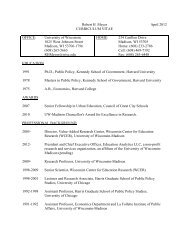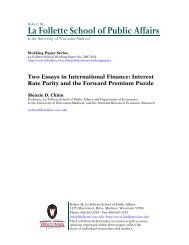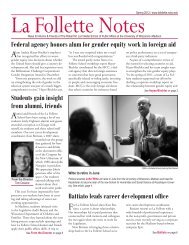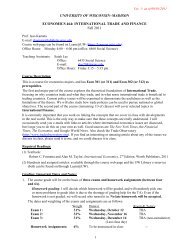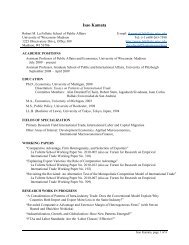SAVE Commission's findings - La Follette School of Public Affairs ...
SAVE Commission's findings - La Follette School of Public Affairs ...
SAVE Commission's findings - La Follette School of Public Affairs ...
Create successful ePaper yourself
Turn your PDF publications into a flip-book with our unique Google optimized e-Paper software.
CHAPTER<br />
FOUR<br />
Actions<br />
GOAL #18<br />
Executive<br />
Branch<br />
Streamline,<br />
eliminating<br />
anachronisms and<br />
look to the future<br />
18.1<br />
Eliminate the <strong>of</strong>fices <strong>of</strong><br />
secretary <strong>of</strong> state and<br />
state treasurer.<br />
18.2<br />
Allow a gubernatorial<br />
candidate to choose a<br />
running mate.<br />
18.3<br />
Place the Governor’s<br />
Office on a sum certain<br />
budget.<br />
18.4<br />
Consolidate functions<br />
where possible.<br />
overnment reorganizations and reinventions<br />
center around themes and visions.<br />
The theme <strong>of</strong> the Commission’s effort is<br />
efficiency and the vision is government<br />
that is logically structured and user<br />
friendly in terms <strong>of</strong> where the state is<br />
headed in the next century.<br />
The executive branch involves both Constitutional<br />
and executive agencies.<br />
As the chief executive <strong>of</strong> the state, the Governor<br />
should have the<br />
right to choose the individual<br />
who is second<br />
in command. While that<br />
has been long accepted<br />
on the national level<br />
with the President and<br />
Vice President, Wisconsin’s<br />
Governor does not<br />
have the ability to select<br />
her or his running mate.<br />
That is done by the voters through the primary<br />
process. The Constitution should be amended<br />
to allow the Governor to select a running mate<br />
<strong>of</strong> her or his choosing to ensure that, should<br />
the need for succession arise, the policies <strong>of</strong><br />
the administration will be fully carried out.<br />
“Create a structure that<br />
encourages and assists strong<br />
executive leadership…to create<br />
a clear policy agenda and<br />
establish accountability.”<br />
William Winter, chairman, Winter Commission<br />
As recommended for other branches <strong>of</strong><br />
government, the Governor’s <strong>of</strong>fice should be<br />
placed on a sum certain budget basis.<br />
Under Wisconsin’s administrative system,<br />
both the state treasurer and secretary <strong>of</strong> state<br />
have little to do with policy making. Therefore,<br />
the constitutional <strong>of</strong>fices <strong>of</strong> secretary <strong>of</strong> state<br />
and state treasurer should be eliminated and<br />
their administrative functions transferred to<br />
existing agencies.<br />
Throughout the country, the trend toward<br />
giving chief elected <strong>of</strong>ficials the authority to do<br />
the job—and then holding them accountable—<br />
is gaining ground. The latest major report on<br />
improving state and local government—the<br />
Winter Commission—strongly urges that governors<br />
have the ability to set state policy agendas<br />
and have the team in place to carry out those<br />
agendas.<br />
Three state agencies now governed by citizen<br />
boards that appoint the secretaries <strong>of</strong> those<br />
agencies and set their policies should become<br />
part <strong>of</strong> the cabinet system. The agencies are:<br />
Department <strong>of</strong> Veterans <strong>Affairs</strong>; Department <strong>of</strong><br />
Natural Resources; Department <strong>of</strong> Agriculture,<br />
Trade and Consumer Protection. Each one <strong>of</strong><br />
the agencies, because <strong>of</strong> public interest in their<br />
activities, should continue to have citizen advisory<br />
boards to provide guidance.<br />
As part <strong>of</strong> its review <strong>of</strong> regulatory and<br />
consumer protection functions, the Commission<br />
found a concern about uneven administration<br />
<strong>of</strong> programs, duplication, competition<br />
and varied quality in such areas as administrative<br />
rules (see Goal #21) and consumer protection.<br />
Specifically mentioned<br />
was the confusion<br />
that exists in the<br />
consumer protection<br />
area.<br />
The Commission<br />
is not prepared to go<br />
further than to say that<br />
consolidation <strong>of</strong> like<br />
functions, including<br />
business regulation<br />
and consumer protection, should be on the<br />
agenda. However, formal prosecution relating<br />
to both those functions should remain in the<br />
Department <strong>of</strong> Justice.<br />
At the present time, six state agencies have<br />
as many as 19 job training programs. The func-<br />
48 CITIZEN • COMMUNITY • GOVERNMENT — WISCONSIN: THE 21 ST CENTURY



